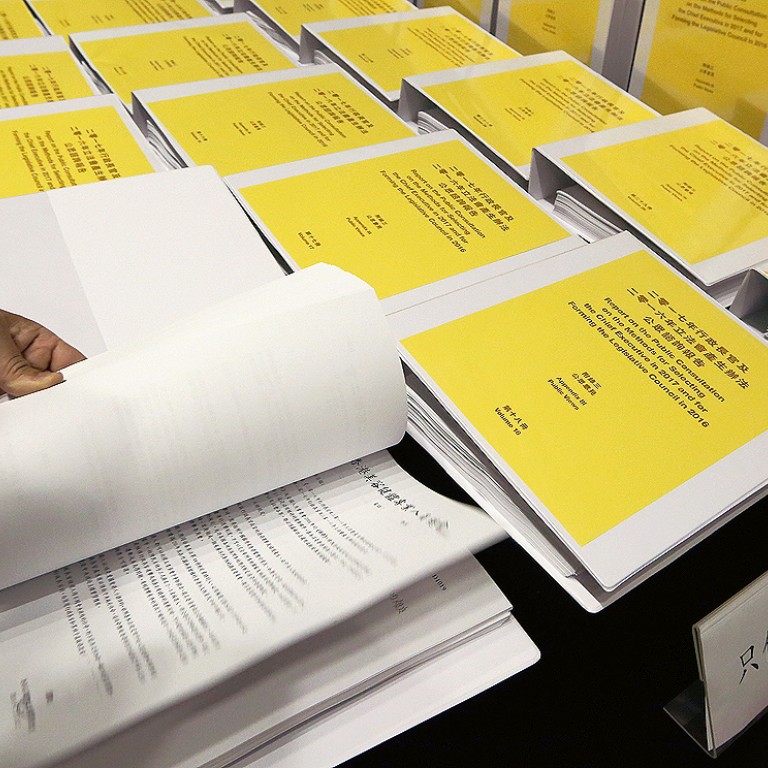
Hong Kong political reform consultation was dominated by 'orchestrated' responses
Academics cast doubt on whether report on reform truly represents public views given 'orchestrated' submissions from 822 groups
The government's consultation exercise on political reform was dominated by "orchestrated" bloc submissions, most of them favouring a conservative stance, a study has revealed.
More than 90 per cent of the 124,700 submissions during the five-month consultation exercise were based on templates and submitted collectively by 822 groups - most of which were not named.
The city's biggest political party, the Beijing-loyalist Democratic Alliance for the Betterment and Progress of Hong Kong, was responsible for 12.7 per cent of the bloc submissions.
The government has relied heavily on the results of the consultation in presenting its report to Beijing on models for the 2017 chief executive election, when the city will elect its leader by one man, one vote for the first time.
A spokesman for the government refused to say whether bloc and individual replies were weighted differently, stating only that the report reflected the views collated.
Academics have urged the government to be cautious in considering the bloc submissions.
"These bloc submissions are clearly orchestrated, presenting a single, unified opinion. We should not take the results at face value," said Professor Paul Yip Siu-fai, a University of Hong Kong demographics expert, who examined some of the submissions with the . He urged the government to commission official opinion polls when it launches a second round of consultation later this year.
The government report summarising the consultation, released last month, did not quantify the responses.
On the issue of how candidates for chief executive should be nominated, it said the "mainstream" view was that the power of the nominating committee, the body tasked under the Basic Law with picking hopefuls, should not be undermined.
Officials later clarified that "mainstream" meant majority opinion. On letting the public nominate candidates - as pan-democrats demand - the report said only that "there are views" in favour.
The report divided submissions into two categories: bloc submissions and individual views. More than 90 per cent - 114,147 out of 121,447, excluding some 3,255 that were ruled out as "late, irrelevant or confidential" - are in the former category. They were based on templates submitted by 822 groups.
The examined the templates, 80 per cent of which were from groups that did not identify themselves. The views were conservative: 74 per cent wanted the nominating committee alone to pick candidates; four per cent favoured public nomination.
The DAB alone turned in some 14,531 questionnaires, more than one in 10 of the total submissions. The government published a sample questionnaire and said all DAB submissions "carried the same content".
"It's not true that all our questionnaires returned the same answers," a DAB spokesman protested. "We didn't compare the answers to each question as we expected the government would do so." The questionnaires were distributed to people who took part in DAB activities, he added.
Other Beijing-loyalist groups submitting bloc responses included the Alliance of Concern Groups on Hong Kong Affairs and the Kowloon Federation of Associations. Named pan-democratic groups accounted for less than one per cent. Occupy Central and the Labour Party each provided 0.2 per cent.
At least three unidentified groups used several identical paragraphs in their templates.
Most bloc submissions had nothing to say about the 2016 Legislative Council election.
The government concluded that respondents therefore "generally agreed" there was no need to abolish the much-criticised functional constituencies, elected by professionals and business organisations. Yip called that a misinterpretation of the data.
The 7,300 submissions by individuals and groups were more balanced. The examined the 600 such submissions that were anonymous. Some 25 per cent backed public nomination, with 42 per cent for the nominating committee.
Ten per cent said both the public and a "democratised" committee should nominate.
"The anonymous group seems to be more in line with the sentiments of the general population," Yip observed. "A logical guess why they chose to hide their names is because they don't want to be retaliated against.
"The exercise might have helped understand the different sentiments about reform but it does not necessarily reflect them in proportion to the whole community," he added.
Dr Chung Kim-wah, director of Polytechnic University's centre for social policy studies, echoed Yip's view that an opinion poll should be used next time.

